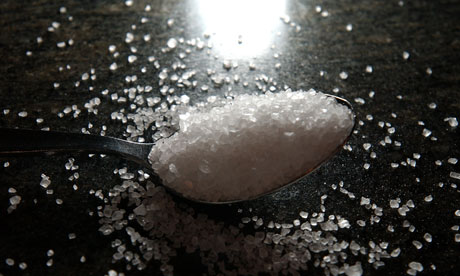
So-called "gourmet" condiments such as rock and sea salt are just as damaging to health as ordinary table salt, despite manufacturers' claims that the products are "natural" and "contain minerals", a study has suggested.
Rock and sea salt have been made popular by TV chefs such as Jamie Oliver and Rick Stein who sprinkle them liberally on their dishes. They are the fastest-growing ranges in the UK's retail salt market – valued at £21m.
However, research from Cash (Consensus Action on Salt and Health) and consumer watchdog Which? reveals that sodium chloride accounts for nearly 100% of all rock and sea salts surveyed and therefore is just a more expensive way of damaging health. The study found that health claims on labels fuel confusion with nearly a quarter of 1,358 Which? members polled (24%) admitting thinking rock and sea salts are healthier than table salt.
In the study the sodium chloride and moisture content of seven different salt products available from supermarkets and online were analysed – including "posh" salts such as Maldon and Himalayan (Best Care Products) and Saxa table salt. Sodium and chloride combine to form salt (NaCl), the combination of minerals which puts up our blood pressure leading to strokes, heart failure and heart disease and also linked to osteoporosis, stomach cancer and kidney disease. Cash said the results show they all contain just as much sodium chloride as each other.
Rock and sea salt cost also cost significantly more than table salt, and nearly half (46%) of Which? members who buy salt said they thought it was worth paying extra for. The study cites a 22-fold difference in price between the premium Halen Môn Pure White Sea Salt at £1.80 and Saxa Table Salt at 8p per 100g. Fleur de Sel from Zauber der Gewürze, a specialist salt, costs £9.29 per 100g. Despite these huge variations, they are all just as damaging for your health, the study claims.
Professor Graham MacGregor of the Wolfson Institute of Preventive Medicine and chairman of Cash, said: "It is disgraceful that chefs still encourage people to use so much sea and rock salt. This has the added danger that, as the crystal sizes are much larger and don't taste as salty, more salt is consumed. Reducing salt intake by just 1 gram per day is predicted to prevent over 6,000 deaths from strokes and heart attacks a year."
Which? chief policy adviser Sue Davies said: "Our research shows that people are needlessly spending more money on 'premium' salt as they often believe it's healthier than traditional table salt. Given that most of the salt we eat is already in the food we buy, the cheapest and healthiest option would be to stop adding extra salt to food altogether."
But manufacturers challenged the findings. In a statement Himalayan (Best Care Products) said: "This survey has been conducted specifically with sodium chloride in mind without paying any attention to the actual mineral and trace element composition of natural salt and its positive effects. Specifically [it] has ignored the damaging effects of chemically cleaned sodium chloride versus a naturally occurring sodium chloride with all other mineral components such as potassium, calcium, magnesium and other minerals and trace elements."

